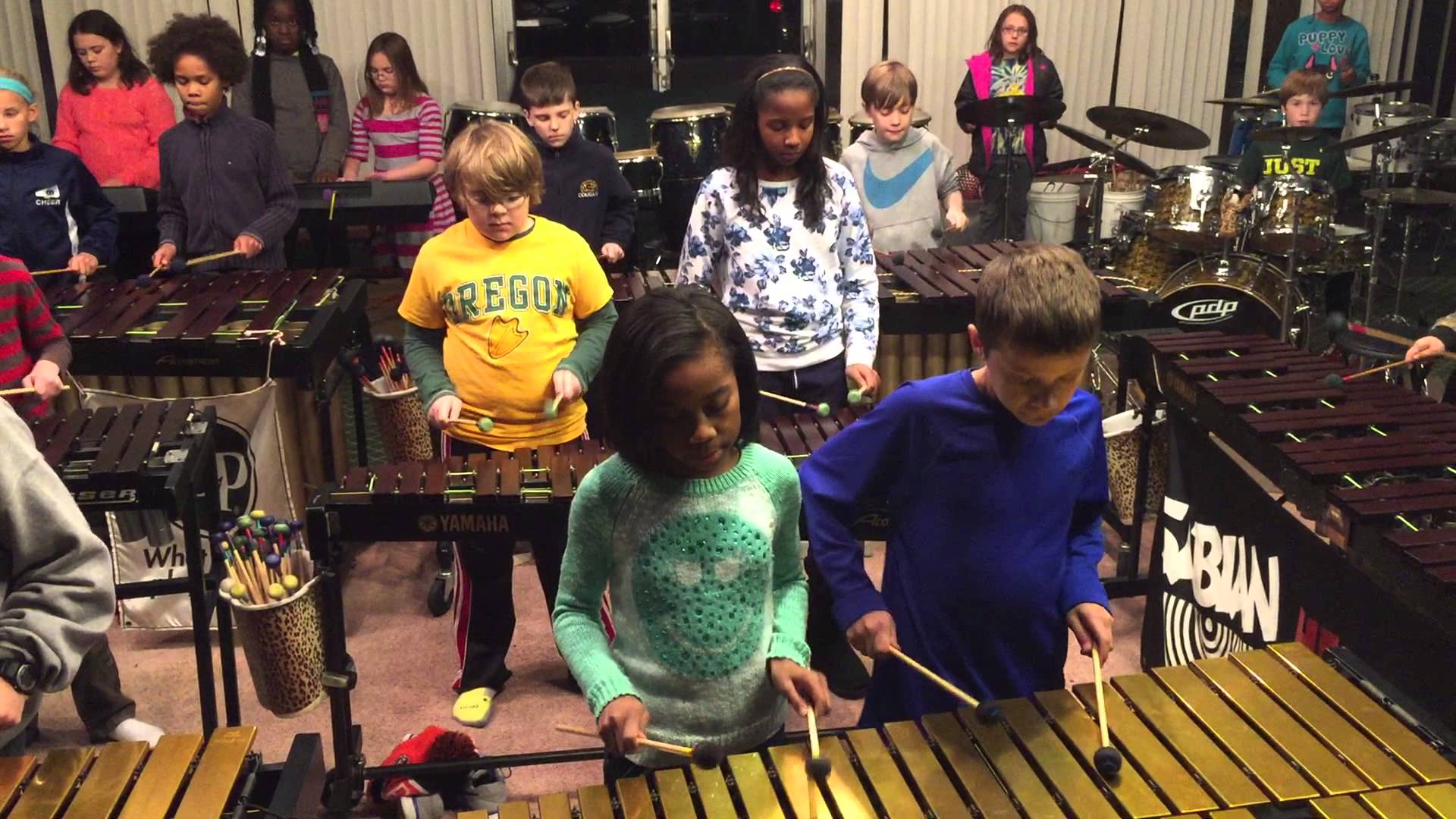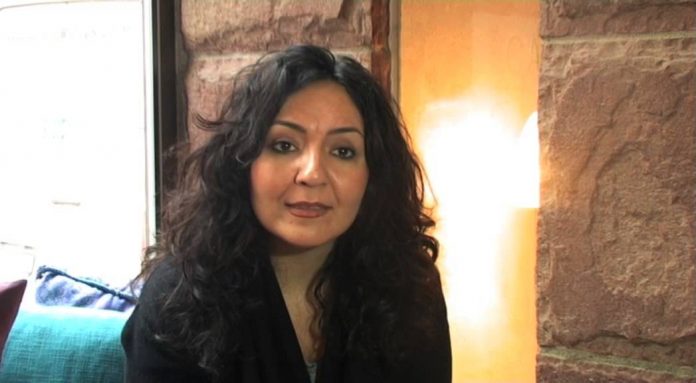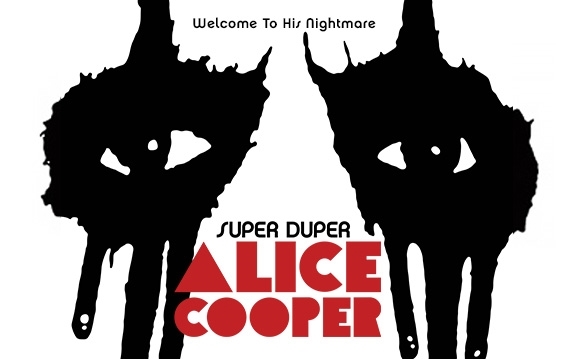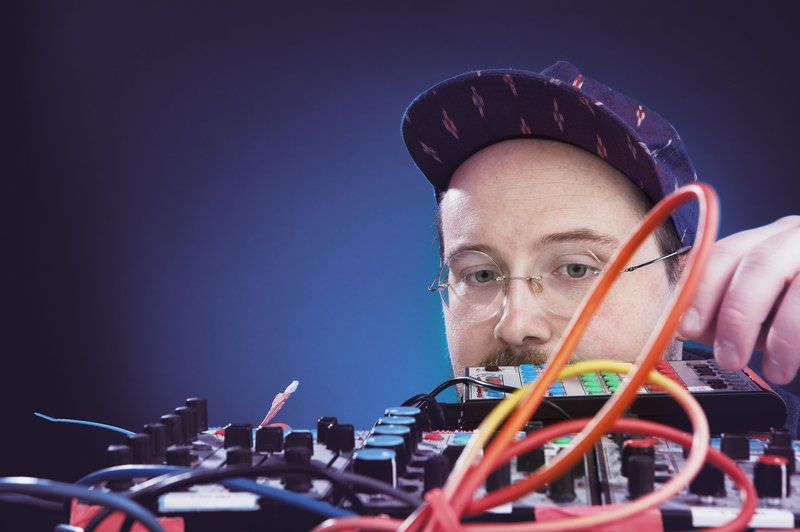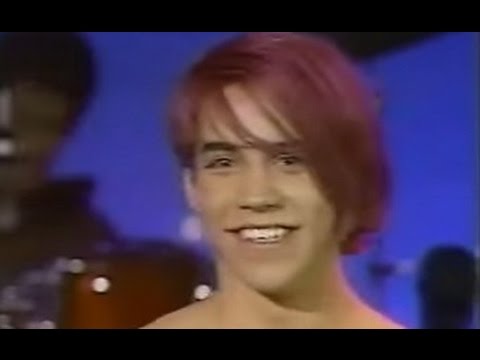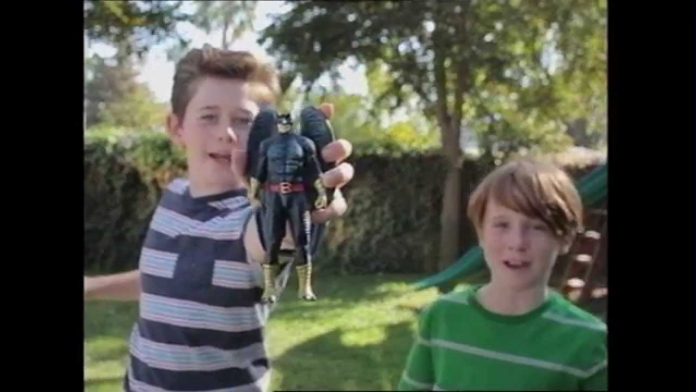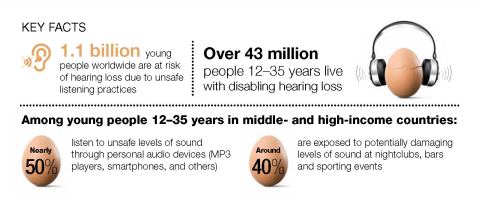Jez Nelson presents a documentary on one of jazz’s most sacred recordings – saxophonist John Coltrane’s masterpiece, A Love Supreme. This programme was originally broadcast on BBC Radio 4 in November 2004 and features interviews with Elvin Jones, Ashley Kahn, McCoy Tyner, Steve Reich and Alice Coltrane.
Children’s Orchestra Plays Ozzy Osbourne’s “Crazy Train” and Zeppelin’s “Kashmir”
The Langley Schools Music Project was a 60-voice chorus of rural school children from western Canada, untrained but captivated by melodic magic, singing tunes by the Beach Boys, Paul McCartney, David Bowie, The Bay City Rollers, and others. The students accompany themselves with the shimmering gamelan chimes of Orff percussion, and elemental rock trimmings arranged by their itinerant music teacher, Hans Fenger.
These 1976-77 recordings, captured on a 2-track tape deck in a school gymnasium, weren’t staged to achieve money or fame, to sell albums or land a record contract. These kids played music because they loved it. Innocent, flawed and bittersweet, guided by Fenger’s unsuspecting genius, these recordings deserve to be heard and preserved. They brim with charm and youthful élan, sparked by flashes of lo-fi Spectorian majesty and Pet Sounds subtlety. Call it folk art, outsider, or campfire rock — the labels don’t matter. These are gorgeous, heavenly artifacts. Period.
These recordings were originally contained on two 12″ LPs, pressed exclusively for the students, their classmates, teachers, and parents. They were never intended for exposure outside the provincial Langley region. But after they came to the attention of Irwin Chusid, the Songs in the Key of Z author and record producer vowed to make these recordings commercially available. He forged a licensing/trustee agreement with the Langley School administrators, and with the blessings of Hans Fenger and several former student soloists who were located, these priceless recordings have now been introduced to the rest of the planet.
I did the PR for the release on Bar/None, and it was one of the greatest projects I’ve ever worked on – I would make 60 phone calls a day, and get 60 interviews with Hans and some of the kid, now adults, involved with the project.
So I was really excited to see these two videos from The Louisville Leopard Percussionists, a non-profit organization offering extracurricular music opportunities to local children at little or no cost. And you should watch them, and then do what you can to help support ideas that bring music to kids, because, well, Zeppelin.
…and because of Ozzy.
Music Freedom Day is Today
Music Freedom Day on March 3 is established as an international day to celebrate freedom of expression and to demonstrate support for persecuted and threatened artists on the music stage worldwide.
Since the freedom of expression organisation Freemuse took the initiative in 2007, more than 100 partners in 36 countries have joined, and Music Freedom Day today is an important celebration of the freedom to create and to play music without intimidation or persecution.
Music Freedom Day is a powerful, united manifestation to support persecuted, prosecuted and imprisoned musicians, many of whose only crime has only been that they have spoken up against authorities and insisted on the right to express themselves through their music. Musicians and composers rights’ to freedom of expression are violated worldwide, but the strong support for Music Freedom Day every year demonstrates the will to continue the advocacy and defence for the universal rights to compose, perform and take part in musical expressions.
Music is a human right, but music is being censored all over the world, and musicians are being prosecuted and imprisoned. This three-minute video contains short interview excerpts and music clips with Outspoken (Zimbabwe), Roger Lucey (South Africa), Manu Chao (Spain), Kris Kristofferson (USA), Ramy Essam (Egypt), Mahsa Vahdat (Iran), Mari Boine (Norway), Didier Awadi (Senegal), Ferhat Tunc (Turkey), Khaled Harara (Palestine), Deeyah (USA / Norway).
Music Trophies Handed Out During Canadian Screen Awards
More than 40 trophies were handed out Saturday, at a pre-show gala, and Sunday during the CBC televised ceremony at the Four Season’s Centre for the Performing Arts. Highlights pertinent to musicians and the music biz:
Achievement in Music: Howard Shore for Maps To The Stars, David Cronenberg’s satirical drama about a child star and a washed up actress.
Achievement in Music: Manjeet Ral, Parmjit Sarai for Dr. Cabbie, and the song “Dal Makhani.” The Bollywood-style Rom-Com tells the story of an Indian doctor who emigrates to Canada and runs into red tape that leads him to become a taxi driver.
Achievement in Overall Sound: Greg Chapman, Peter Persaud, Andrew Stirk, Andrew Tay, Mark Zsifkovits – Pompeii.
Achievement in Sound Editing: Steve Baine, Kevin Banks, Stephen Barden, Fred Brennan, Alex Bullick, J.R. Fountain, Kevin Howard, Jon Mooney, Jill Purdy – Pompeii.
Ted Rogers Best Feature Length Documentary Award: Super Duper Alice Cooper – Sam Dunn, Reginald Harkema, Scot McFadyen. Celebrated Toronto production firm Banger Films earns kudos for its fast, funny and stylized tale of Vincent Furnier’s journey from preacher’s son to the shock rock superstar known as Alice Cooper.
Best Editing in a Feature Length Documentary: Reginald Harkema, Alex Shuper –- Super Duper Alice Cooper.
‘You Have To Be Bored’: Dan Deacon On Creativity
I understand there’s a great story behind the song “Learning to Relax.”
Yeah. I was doing what I thought was relaxing, but was actually just killing time: I was on Facebook. And a friend of mine posted a video from the Toronto Film Festival of Bill Murray talking about his approach to acting — or his philosophy about life, I guess. And it just completely blew me away, because he said, “Whatever your job is, the more relaxed you are, the better you are.”
And to me this was just like, “What are you talking about? I forgot that word even existed!” Because I very much was a person who was motivated by stress; I would use a deadline as a motivator. I think a lot of people do that, where they’re like, “I’ll just wait until the last minute, and that’ll light a fire underneath me and I’ll get it done.” And I just kept thinking, “Well, that’s a terrible way to live. Why am I building a house and lighting a fire in the basement just to see if I can finish the roof before it burns down my whole house?”
I started realizing how important it is to truly relax, and in relaxing, to be bored. You have to be bored. If you’re not bored, your mind is never gonna wander, and if your mind never wanders, you’re never gonna get lost in thought, and you’re never gonna find yourself thinking things you wouldn’t have otherwise thought.
Via NPR
Canadian Arts/Media Job Posts For March 2, 2015
RBC in Toronto, ON has an opening for a Director, Wealth Management and Insurance Communications.
The Kidney Foundation of Canada Manitoba Branch is seeking a Program Coordinator.
Concord Pacific in Vancouver has an opening for a Marketing and Public Relation Officer.
Toronto’s 680News is seeking a Part-Time Audio Editor.
FunnyFest in Calgary, AB has an opening for a Co-ordinator media relations.
Margaret Atwood’s 10 Rules Of Writing
1. Take a pencil to write with on aeroplanes. Pens leak. But if the pencil breaks, you can’t sharpen it on the plane, because you can’t take knives with you. Therefore: take two pencils.
2. If both pencils break, you can do a rough sharpening job with a nail file of the metal or glass type.
3. Take something to write on. Paper is good. In a pinch, pieces of wood or your arm will do.
4. If you’re using a computer, always safeguard new text with a memory stick.
5. Do back exercises. Pain is distracting.
6. Hold the reader’s attention. (This is likely to work better if you can hold your own.) But you don’t know who the reader is, so it’s like shooting fish with a slingshot in the dark. What fascinates A will bore the pants off B.
7. You most likely need a thesaurus, a rudimentary grammar book, and a grip on reality. This latter means: there’s no free lunch. Writing is work. It’s also gambling. You don’t get a pension plan. Other people can help you a bit, but essentially you’re on your own. Nobody is making you do this: you chose it, so don’t whine.
8. You can never read your own book with the innocent anticipation that comes with that first delicious page of a new book, because you wrote the thing. You’ve been backstage. You’ve seen how the rabbits were smuggled into the hat. Therefore ask a reading friend or two to look at it before you give it to anyone in the publishing business. This friend should not be someone with whom you have a romantic relationship, unless you want to break up.
9. Don’t sit down in the middle of the woods. If you’re lost in the plot or blocked, retrace your steps to where you went wrong. Then take the other road. And/or change the person. Change the tense. Change the opening page.
10. Prayer might work. Or reading something else. Or a constant visualisation of the holy grail that is the finished, published version of your resplendent book.
Via The Guardian
Red Hot Chili Peppers’ First time on TV back in 1984
Here are the Red Hot Chili Peppers making their first TV appearance back in 1984. The show was Alan Thicke’s Thicke of the Night (and yes, that’s Robin of Blurred Lines’ dad.)
http://youtu.be/jZRdjZFffnQ
Fox Searchlight release 1990s-style Birdman action figure television commercial
Hey kids! You too can now defeat Birdman’s arch-nemesis The Condor with this spiffy Birdman Action Figure! Batteries not included. Fox Searchlight has released a fantastic 1990s-style Birdman action figure television commercial to celebrate the film‘s recent “Best Picture” Oscar win.
March 3rd is International Ear Care Day
1.1 billion teenagers and young adults are at risk of developing hearing loss due to the unsafe use of personal audio devices and exposure to damaging levels of sound in noisy entertainment venues, according to the World Health Organization. Under the theme “Make Listening Safe”, WHO draws attention to the rising problem of noise-induced hearing loss due to recreational exposure to loud sounds.
Data from studies in middle- and high-income countries analysed by WHO indicate that among teenagers and young adults aged 12-35 years, nearly 50% are exposed to unsafe levels of sound from the use of personal audio devices and around 40% are exposed to potentially damaging levels of sound at entertainment venues. Unsafe levels of sounds can be, for example, exposure to in excess of 85 decibels (dB) for eight hours or 100 dB for 15 minutes.
“As they go about their daily lives doing what they enjoy, more and more young people are placing themselves at risk of hearing loss,” notes Dr Etienne Krug, World Health Organization (WHO) Director for the Department for Management of Noncommunicable Diseases, Disability, Violence and Injury Prevention. “They should be aware that once you lose your hearing, it won’t come back. Taking simple preventive actions will allow people to continue to enjoy themselves without putting their hearing at risk.”
Safe listening depends on the intensity or loudness of sound, and the duration and frequency of listening. Exposure to loud sounds can result in temporary hearing loss or tinnitus which is a ringing sensation in the ear. When the exposure is particularly loud, regular or prolonged, it can lead to permanent damage of the ear’s sensory cells, resulting in irreversible hearing loss.
WHO recommends that the highest permissible level of noise exposure in the workplace is 85 dB up to a maximum of eight hours per day. Many patrons of nightclubs, bars and sporting events are often exposed to even higher levels of sound, and should therefore considerably reduce the duration of exposure. For example, exposure to noise levels of 100 dB, which is typical in such venues, is safe for no more than 15 minutes.
Teenagers and young people can better protect their hearing by keeping the volume down on personal audio devices, wearing earplugs when visiting noisy venues, and using carefully fitted, and, if possible, noise-cancelling earphones/headphones. They can also limit the time spent engaged in noisy activities by taking short listening breaks and restricting the daily use of personal audio devices to less than one hour. With the help of smartphone apps, they can monitor safe listening levels. In addition they should heed the warning signs of hearing loss and get regular hearing checkups.
Governments also have a role to play by developing and enforcing strict legislation on recreational noise, and by raising awareness of the risks of hearing loss through public information campaigns. Parents, teachers and physicians can educate young people about safe listening, while managers of entertainment venues can respect the safe noise levels set by their respective venues, use sound limiters, and offer earplugs and “chill out” rooms to patrons. Manufacturers can design personal audio devices with safety features and display information about safe listening on products and packaging.
To mark International Ear Care Day, celebrated each year on March 3rd, WHO is launching the “Make Listening Safe” initiative to draw attention to the dangers of unsafe listening and promote safer practices. In collaboration with partners worldwide, WHO will alert young people and their families about the risks of noiseinduced hearing loss and advocate towards governments for greater attention to this issue as part of their broader efforts to prevent hearing loss generally.
Worldwide, 360 million people today have moderate to profound hearing loss due to various causes, such as noise, genetic conditions, complications at birth, certain infectious diseases, chronic ear infections, the use of particular drugs, and ageing. It is estimated that half of all cases of hearing loss are avoidable. To address this issue, WHO collates data and information on hearing loss to demonstrate its prevalence, causes and impact as well as opportunities for prevention and management; assists countries to develop and implement programmes for hearing care that are integrated into the primary health-care system; and provides technical resources for training health workers.

